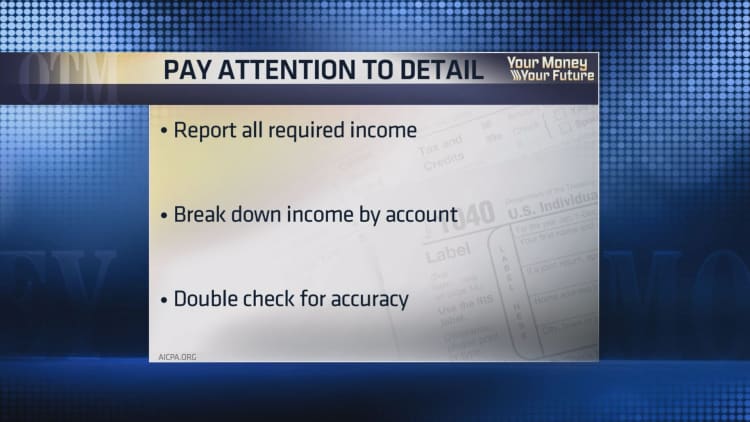
Your chance of a tax audit is low. Only about 0.7 percent of tax returns receive an audit from the IRS.
Yet before you take your chances with some dodgy deduction, know this: That figure jumps to 9.5 percent if you make $1 million or more annually.
"The more money you have, the more of a chance you have of being audited," said Dave Du Val, chief consumer advocacy officer at TaxAudit.com, an audit defense company that handles more than 25,000 audits per year.
Whether you're a higher earner or someone in a lower tax bracket, you can take these steps to reduce your chances of getting on the IRS radar.
Report all your income
This may seem obvious, but leaving off any income could have you facing down the tax man.
The IRS will go after taxpayers when the agency has a document, like a 1099 or W-2, that matches income with a Social Security number if you don't report it, said Mike Campbell, a certified public accountant and tax partner at BDO USA.
That includes any 1099-MISC or 1099-K you may receive from a side hustle, like driving for Uber or renting out your place on Airbnb.
The same is true if you have holdings overseas. You are required to fill out an annual report of foreign bank and financial accounts and Form 8938 to the Treasury Department and IRS if you own international assets.
Detail your big deductions well
IRS auditors focus on the outliers. Why? They don't have the manpower to do much else.
The number of IRS staff that enforces tax laws has declined 23 percent from more than 50,000 in 2010 to fewer than 39,000 in 2016.
"The IRS is looking for deductions that don't make sense," Campbell said.
Huge losses on your rental property, large charitable donations relative to income and suspicious round numbers on your returns will raise an auditor's eyebrows.
Charitable giving is particularly troublesome. For example, you paint an audit target on your back if you fail to file a Form 8283 for noncash donations of more than $500.
However, no deduction is incriminating if you have the documentation to back it up.
Keep good records
Avoiding an audit comes down to records. The more extensive your files, the better the odds of escaping without a penalty.
That means if you are going to claim a big home-office deduction, you better have the documents to prove that you only use the space for business, Du Val said.
Same goes for claiming you use your car 100 percent for work. The IRS likes a contemporaneous mileage log, meaning that you shouldn't try to recreate it if you neglected to record your miles last year.
"It's never a good idea to try to cheat the tax man," Du Val said.
Even if you run afoul of auditors because you didn't know the complicated tax rules, ignorance is no defense. "U.S. Tax Court is not a court of justice, it is a court of law," Du Val said.


